
The Shocking Truth: A Guide to Electrical Safety
Electricity is integral to modern life, powering our homes, workplaces and devices. While incredibly useful, it poses significant risks if not handled properly. Electrical accidents can lead to severe injury or even death. It’s crucial to prioritize electrical safety in every aspect of our lives. This guide will explore tips to protect you and your loved ones from electrical hazards.
What Is Electrical Construction?
Electrical services in construction refers to installing, assembling and maintaining electrical systems and infrastructure in various settings, such as residential, commercial and industrial buildings. It involves the planning, designing and installing electrical components, wiring, fixtures and equipment to ensure the safe and efficient distribution of electricity.
Electrical construction encompasses a wide range of activities, including the installation of:
|
|
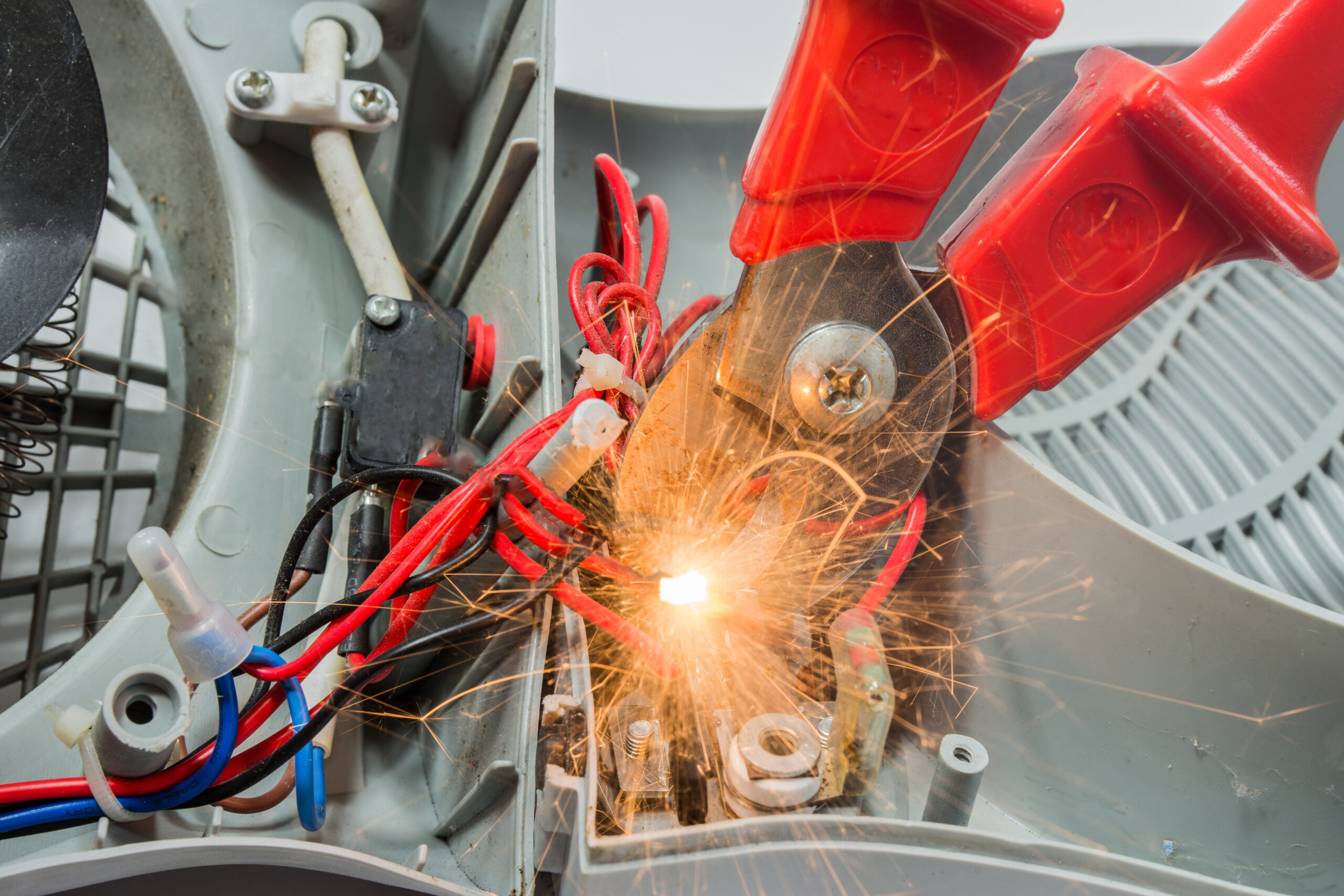
It also involves integrating specialized electrical systems like fire alarms, security systems and communication networks.
The team that handles and maintains electrically powered equipment adheres to electrical safety as a fundamental practice. It involves following guidelines aimed at mitigating electrical hazards and preventing the potentially dangerous consequences of an incident. Failing to comply with electrical safety measures can result in accidents, near misses or even fatalities.
What are the Electrical Hazards in Construction?
Electrical hazards on construction sites refer to the electrical risks that workers face and need to take precautions against. These hazards can pose significant risks and potential for electric shock incidents.
Let’s look at examples of electric shock hazards in the construction industry:
Contact With Live Wires
Accidental contact with live wires during construction, such as drilling, digging, or demolition, can result in electric shocks or electrocution. Electric shock occurs when the human body encounters an electric current.
Inadequate Grounding
Improper equipment grounding is the most frequent Occupational Safety and Health Administration (OSHA) electrical violation. Improper grounding of electrical equipment or systems can lead to the buildup of electrical charges, increasing the risk of electric shock if touched. It is crucial never to remove the metallic ground pin, as it plays a vital role in safely returning unwanted voltage to the ground.
Overhead Power Lines
Working near overhead power lines without proper precautions can be extremely dangerous. Overhead power lines carry high voltages that pose a significant risk of severe burns and electrocution to workers. Accidental contact or proximity to these power lines can cause severe electric shocks or fatal injuries. Maintaining a minimum distance of 10 feet from overhead power lines and adjacent equipment is critical to ensure safety.
Temporary Power Systems
Using temporary power systems on construction sites can introduce electrical hazards if not installed, maintained and operated correctly. Faulty connections, damaged cables or inadequate grounding can result in electric shock risks.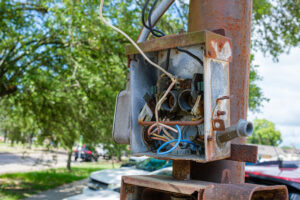
Damaged or Exposed Wiring
Construction sites often involve rough environments that can cause damage to electrical wiring. Exposed or damaged wiring increases the chances of electric shock hazards for workers. Conduct a comprehensive inspection for cracks, cuts or abrasions on cables, wires and cords. It is crucial to utilize the appropriate wire suitable for the specific operation and electrical load being worked on to ensure that items are adequately secured with appropriate guarding mechanisms and to regularly inspect for any exposed parts that require immediate repair.
Damaged Insulation
Inadequate or faulty insulation poses a significant hazard. It is important to stay vigilant for any signs of damaged insulation and promptly report it. Before replacing damaged insulation, always ensure that all power sources are turned off. Never attempt to cover damaged insulation with electrical tape.
Wet Conditions
Construction sites are prone to wet conditions due to the nature of the work and weather. Never operate electrical equipment in wet conditions. Water increases the risk of electrical accidents since water is a conductor of electricity.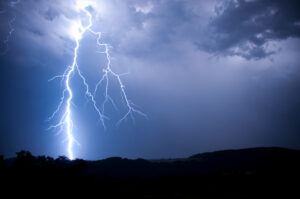
Inadequate Personal Protective Equipment
Exposure to faulty electrical equipment and tools can be hazardous. Insufficient or improper use of personal protective equipment, such as insulated gloves, safety boots or helmets, leaves construction workers more vulnerable to electric shock hazards.
Insufficient Training and Awareness
Lack of proper electrical safety training and awareness among construction workers can increase the risk of electrical accidents. Understanding the potential hazards and following safety protocols is crucial for mitigating risks.
Working at Heights
Construction work often involves working at heights, bringing workers close to power lines. Failure to maintain proper clearance or use appropriate safety measures can result in electric shock incidents.
Inadequate Lockout/Tagout Procedures
Lack of proper lockout/tagout procedures when servicing or repairing electrical equipment can lead to unexpected energization, putting workers at risk of electric shock. Before conducting any electrical maintenance or repairs, it is imperative always to follow Lock Out/Tag Out procedures. These procedures are in place to safeguard all workers present on the worksite.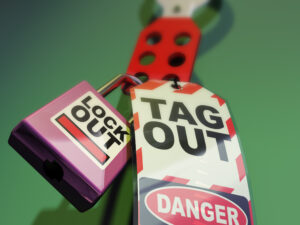
Electrical Safety Tips
When it comes to electrical safety, implementing proper electricity safety precautions and following guidelines is crucial to minimize the risk of accidents.
Here are some electrical safety tips to consider:
Avoid Water Contact
Keep electrical appliances and equipment away from water sources to prevent electric shocks. Never operate electrical devices with wet hands; ensure your work area is dry when handling electrical components.
Inspect Cords and Plugs
Regularly check power cords, plugs and outlets for signs of damage, such as fraying, exposed wires or loose connections. Damaged cords and plugs should be replaced immediately to prevent electrical hazards.
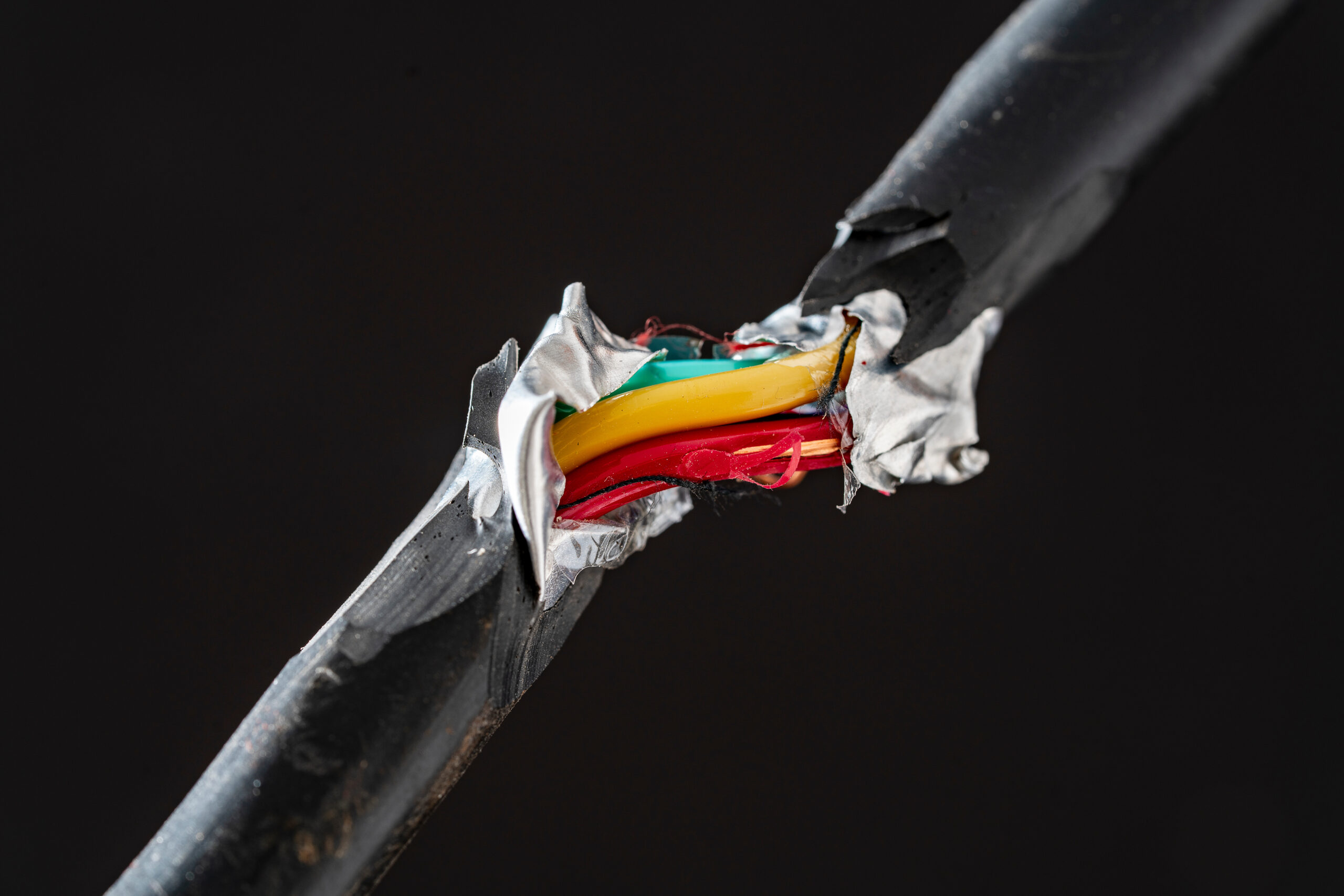
Properly Store Cables
Avoid running electrical cords across walkways or under carpets, as they can become tripping hazards or suffer damage. Use cable management solutions, such as cord covers or cable trays, to keep cords organized and out of the way.
Use Appropriate Wattage
Ensure that light bulbs and electrical appliances use the correct wattage as recommended by the manufacturer. Using bulbs with wattage exceeding the fixture’s capacity can lead to overheating and electrical fires.
Unplug When Not in Use
When appliances and devices are not in use, unplug them from outlets. This practice reduces the risk of electrical malfunctions and prevents energy wastage.
Use Safety Equipment
When working with electricity, wear appropriate personal protective equipment such as insulated gloves, safety glasses and flame-resistant clothing to protect yourself from potential hazards.
Use Testing Equipment
To prevent electric shocks and potentially fatal electrocutions, it is essential to utilize approved electrical power testing equipment. This enables you to accurately assess the level of risk associated with a particular operation.
Have Regular Inspections
Schedule periodic inspections of your electrical systems by qualified professionals to identify and address potential hazards or electrical issues.
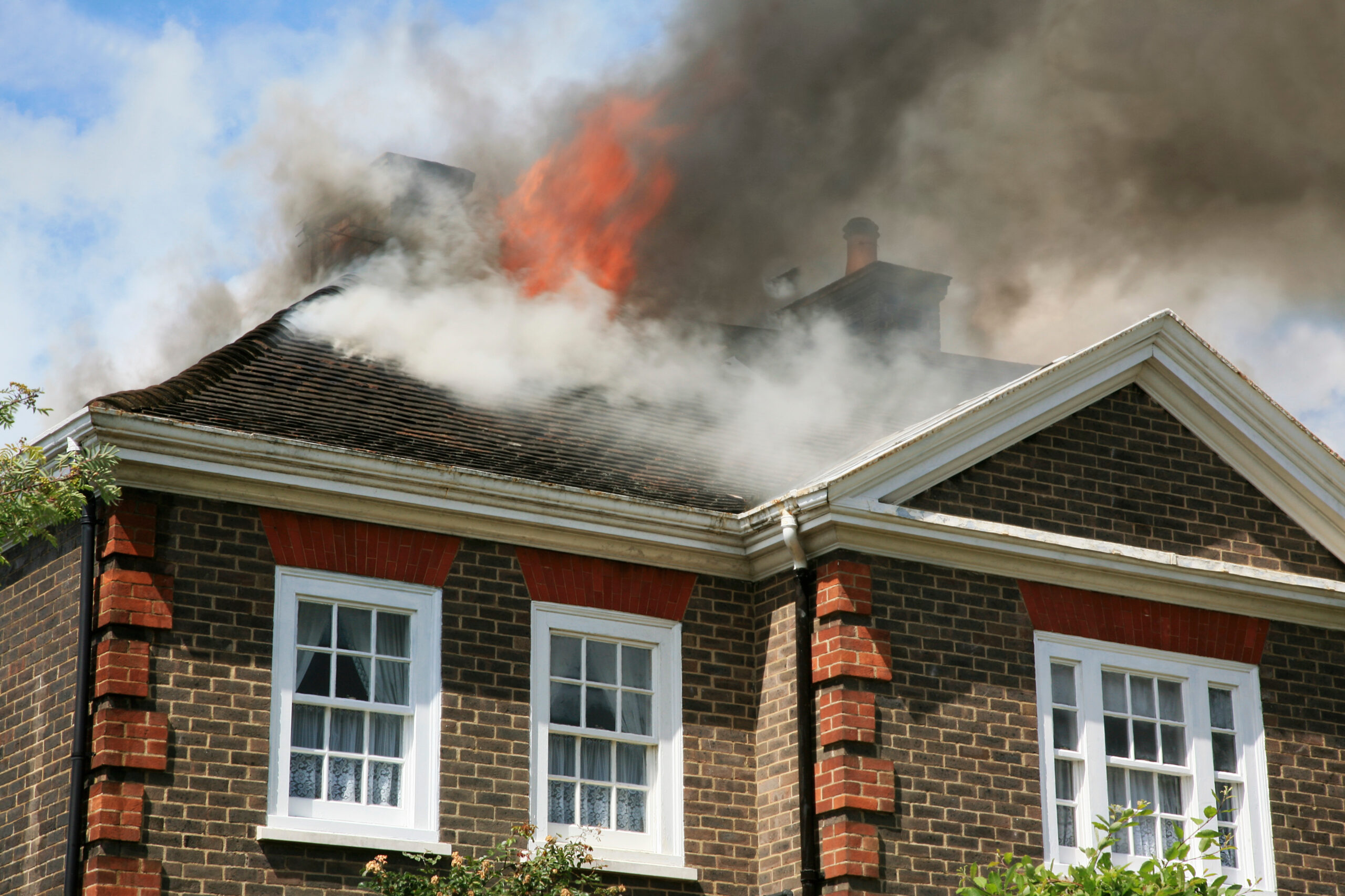
In Summary
Have a plan in place for what to do in case of an electrical emergency. Know the location of your circuit breaker and how to shut off power to your home if needed. Keep emergency contact numbers handy and teach family members what to do in case of an electrical accident.
By following these tips and prioritizing electrical safety in your home and workplace, you can significantly reduce the risk of electrical accidents and ensure a safer environment for yourself and your loved ones.
Remember, when it comes to electricity, safety should always come first.
Electrical Offerings through GBA Facility Services
GBA’s Facility Services team has been performing electrical services for our construction clients for the last year. This team brings with it over 40 years of field experience. Clients in critical and technically demanding environments have unique facility needs as operations must remain uninterrupted and reliable. GBA understands the nature of these specific needs and offers a team of construction managers field-trained to address this demanding environment.